Cases
They are held in-person at the School of Physical Education, Physiotherapy and Dance, Federal University of Rio Grande do Sul (UFRGS), Brazil; and online, through the Zoom platform. The classes aim to provide social interaction and sense of community; improve memory and cognition; and stimulate imagination and creativity.
Each class consisted of:
- an opening message;
- Part 1 – The sitting-on-a-chair activities: Joint warm-up and mobility, upper and lower body stretching, breathing and rhythmic exercises, and body awareness;
- Part 2 – The standing-with-a-chair activities: Strength, balance and rhythm exercises;
- Part 3 – The free-standing activities: around the room inspired by Brazilian rhythms.
- This was followed by a cooling down, and a final message
The whole program involved a team including an associate professor, four experienced dance teachers and four undergraduate dance students.
https://www.youtube.com/channel/UCILPKVSA-7LygQ-zAh5wR3A
According to our research results, dance contributes to improve and maintain the participants’ motor and non-motor symptoms, impacting on perceived physical, mental and social aspects of quality of life. Thus, the “Dança e Parkinson” project is an important strategy to contribute to complementary rehabilitation in people with Parkinson’s Disease.
From the School of Physical Education, Physiotherapy and Dance, Federal University of Rio Grande do Sul, Porto Alegre, Brazil. Submitted by Aline Haas.
Articles:
Summary
This program has been developed since 2005 as a regular internship activity for Psychology students at PUC-SP. The program has the support of the Brazilian Alzheimer’s Association and takes place in a space granted by the community in São Paulo.
Each semester a new intern team is trained to work with people with dementia and their families, and interventions are offered over 12 weeks with group activities in which there is socialization, cognitive stimulation, guided walks and thematic events.
The objective of the work is to prepare the families for a better acceptance of the diagnosis with an inclusive approach that benefits from potentialities that remain and promotes integration through enjoyable activities for recovering identity and dignity.
In the absence of motivation and in the face of cognitive impairment, it is common for people with dementia to interrupt or reduce activities due to frustration and disabilities. The program restores the possibility of social interaction by offering individualized support with the necessary help to participate with maximum autonomy. The perception of accomplishment in completing tasks, even with assistance, raises the sense of accomplishment, which is fundamental to satisfaction and therefore contributes to the mentioned sense of identity.
Results show an improvement in the mood and functionality with reports from family members stating that people with dementia become more alert and socially active after taking part in the groups.
The proposal involves feedback at the end of each semester with recommendations for activities useful for each program participant with a written report.
Detail
Fernanda Gouveia has been a psychologist and volunteer at the Brazilian Alzheimer’s Association (Abraz) since 2005, building up experience and connecting with a population living with a complex diagnosis and the lack of resources and strategies to deal with daily challenges. This is why she created a series of programs and materials aimed at empowering families, reducing the burden and strengthening non-pharmacological resources for coping with dementias. From 2011 to 2014 she chaired Abraz, a period during which informative materials and training for support group coordination were created.
The GRUPO INTERATIVO program works at no cost through mutually beneficial partnerships. Abraz refers patients from and students from the psychology course at PUC-SP – under her supervision – follow the project free of charge.
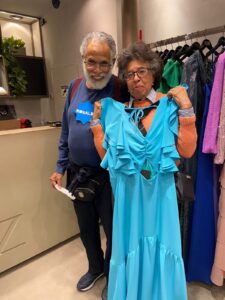
Every semester a new team of interns (7 to 9) receives a 5 week training course on how to work with people with dementia, providing them with training on symptoms, treatments, emotional and social consequences as well as cognitive stimulation and group facilitation strategies.
In the following 12 weeks the intervention program takes place, which involves the following steps:
1 – Screening of new cases:
- A) In-depth interview with family caregiver to register previous story and diagnosis, initial and current symptoms, treatments used, perceived changes, difficulties experienced, strategies for symptom management and emotional repercussions.
- B) Cognitive screening tests and social interaction to verify the main abilities versus difficulties. With this it is possible to say if it will be possible to participate in the groups according to distribution criteria.
2 – DISTRIBUTION of participants into 3 groups (number of rooms) including 1 group for family caregivers and 2 groups for people with dementia distributed between mild to moderate and moderate to severe stages.
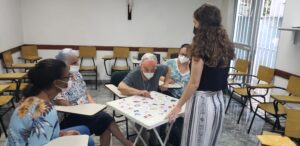
3 – INTERVENTION with family carers. The group of caregivers is always heterogeneous with participants from different parentage, age and time in the role of caregiver. It is not necessary for the diagnosed person to participate in the groups for the inclusion of family members, since some may be with relatives in an advanced stage, therefore not meeting the criteria.
Frequent themes for interventions involve disclosure of diagnosis, sociability, autonomy and decision-making, caregiver self-care, and symptom management.
4 – GROUP INTERVENTION FOR PEOPLE WITH DEMENTIA. Distributed according to stage and symptoms, people with Alzheimer’s and other dementias are offered spaces for interaction with activities that are achievable, but involve challenges and support to ensure achievement and satisfaction. Therefore, the program involves the development of actions in a tailored and creative approach by considering previous habits and biography.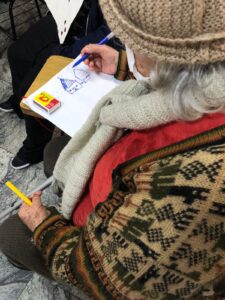
Some precautions are fundamental to guarantee the well-being of participants:
- A) often patients are unaware of their diagnosis, so the objective revealed may be stimulation to improve brain functioning;
- B) all people with dementia and trainees wear a badge to facilitate communication based on a visual clue without memory input;
- C) the activities developed need to be pleasurable to ensure their safety and sustainability;
- D) individualized record of emotional and cognitive responses is carried out for patient-centered follow-up that will allow family guidance;
- E) socialization moments are always encouraged and prioritized.
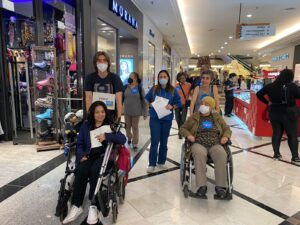
5 – COMMON ACTIVITIES. Throughout each semester, at least two meetings are held involving patients and carers. Activities such as outings to museums and squares have already been carried out. To exemplify the type of action: we have already carried out a competition in a shopping mall (safe environment and with accessibility) with the establishment of teams and clues involving the collection of letters which will form a word to be taken to an afternoon coffee. It involves challenges in which they need to interact with external people and team members, take pictures, record information in a dynamic and fun way. The actions are monitored by students from the psychology course and the family members receive guidance that encourages autonomy. At the end of each semester a thematic party is held, which may involve the Festa Junina, Christmas party, World Cup or whatever theme is selected.
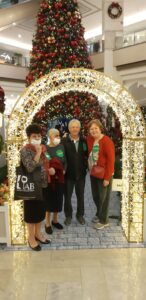
The benefits of the programe may involve:
– Family members with greater acceptance and flexibility for necessary adaptations;
– Family members with a social support network to support changes through the exchange of experiences and group identification;
– Increased repertoire of cognitive and social stimulation activities;
– Training of professionals capable of identifying symptoms, favouring early diagnosis and adequately guiding possible non-pharmacological treatments in Dementia;
– Breaking the stereotypes that there is nothing to do in cases of dementia.
Contact:
Fernanda Gouveia Paulino – São Paulo, Brazil – PhD in Clinical Psychology, Faculty at the Pontifícia Universidade Católica de São Paulo (PUC-SP) – fegouveia(at)pucsp(dot)br
The Memory Making project has been ongoing since 2009 as part of the Art & Inclusion workshop, founded in 2007 to support people living with the consequences of stroke, Alzheimer’s disease and other conditions. Appreciating art activates areas that remain intact, even if dementia does not allow this to be spoken about and understood by others.
The experience acquired over these years of the project shows that elderly people who are integrated into community life do not lose their leading role, regardless of the disease involved. Unlike most elderly people with Alzheimer’s, the participants of the Memory Making have the opportunity to be individuals who are socially active, preventing the disease from destroying the people’ essence.
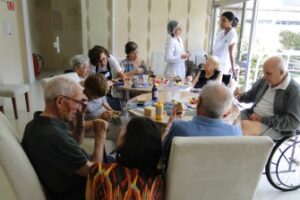
Providing the elderly with Alzheimer’s the opportunity to interact with art is a pleasurable way to offer cognitive stimulation, helping the disease to be better understood and preserving dignity even in the process of loss. Through the images exhibited in a museum, the person has a valuable encounter with himself, even if everything is a bit mixed up. It is a way of keeping the brain functions that remain active burning for longer, preserving abilities through playful activities with purpose.
https://www.youtube.com/watch?v=2Q0BRisbU5o
The big goal of the project is to give access to older people living with dementia and their families, and for this it is necessary to explore funding sources that can offer the program free of charge. This is a big challenge with projects involving art and complex diagnoses, especially in Brazil. Most of the classes that completed the experience are self-funded, but we also have free classes that receive support through the Culture Initiative Laws – a Brazilian project that allows the donation of a percentage of the income tax paid in benefit of social projects.
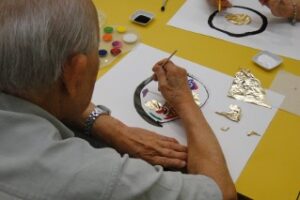 There are countless positive impacts observed by all – our instructors, enrolled players and their families – starting with socialization, a fundamental human characteristic for the development of our cognitive skills, the reason why the program takes place in group visits. In addition, the improvement in mood and the reduction of frustration are immediate, since in the artistic process it is possible to recover the autonomy that throughout the dementia process is compromised.
There are countless positive impacts observed by all – our instructors, enrolled players and their families – starting with socialization, a fundamental human characteristic for the development of our cognitive skills, the reason why the program takes place in group visits. In addition, the improvement in mood and the reduction of frustration are immediate, since in the artistic process it is possible to recover the autonomy that throughout the dementia process is compromised.
When space allows, the group walks through an art exhibition discussing the works, their creators, their curiosities and historical facts to then reproduce the classic works in a studio. In this space they are not cared for by someone, they are not one step down listening to what can or cannot, but they are the owners of their art, their perspective and their vision.
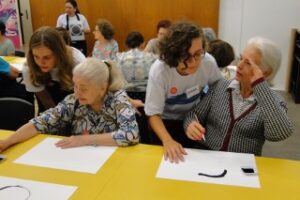
For further information:
CEO Memory Making Project: Cristiane Terani Pomeranz. Art-Therapist with Masters in Gerontology
crispomeranz(at)gmail(dot)com
During the COVID-19 pandemic, the psychiatrist Luis Motta was working in a hospital in Porto Alegre, Brazil, which received patients in a serious condition due to the disease, but also elderly patients who were being admitted for countless other reasons. The challenge was enormous to maintain the safety and well-being of all, and so it was necessary to rush to treat and send the patient home as soon as possible, carrying out the treatment in an environment with less risk of infection.
In a leading position in the psychiatric ward, many admissions of elderly people diagnosed with dementia passed through his hands. Unfortunately, but for the protection of these elderly people, the recommendation was to take them to hospital as a last resource.
This is how the idea of setting up a service that could follow up these families post diagnosis or post admission was born, not only to evaluate the effectiveness of drug treatment, but to explore countless other strategies that could improve the quality of life for all those involved in the care ecosystem.
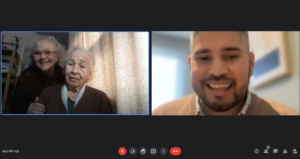
Luis brought together a team with personal and professional experience in dementia management, always with a multidisciplinary look not only to aggregate different expertises, but to join compelling narratives that complement each other, thus avoiding the medic-centric model. Hope relies today on professionals in nursing, psychiatry, neurology, neuropsychology, specialists in care and a creative team.
In Latin American countries it is common to ignore the symptoms of dementia because of the stigma of ageing, or to leave a diagnostic appointment without support to manage the increasing challenges that such a diagnosis can bring. Hope refuses to allow families to suffer the consequences of the lack of assistance from the health system – public and private – and to think that the only solution should be a pill, instead of the rescue of dignity and the biography of people with dementia.
With its own methodology, Hope builds the patient’s biography upon a series of interviews between different members involved in the care and a Hope navigator in charge of the family. Nobody, private or public, can offer this dedication to an immersion in biographical data that is fundamental to managing, for example, challenging behaviour.
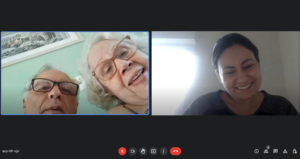 With the patient’s biography built, it is possible to understand significant moments for an overview of the patient’s global health, involving physical, cognitive, social, economic and spiritual health. Thus Hope moves on to a care plan elaboration, which is nothing more than understanding how art and other non-pharmacological alternatives can benefit that individual and their family members.
With the patient’s biography built, it is possible to understand significant moments for an overview of the patient’s global health, involving physical, cognitive, social, economic and spiritual health. Thus Hope moves on to a care plan elaboration, which is nothing more than understanding how art and other non-pharmacological alternatives can benefit that individual and their family members.
“I was completely lost! I didn’t know how to handle the situation. The doctor just gave the treatment and sent us back home, and I can’t accept my father losing his leading role as if he were being defeated! Hope has shown me that there is still a lot to be done, and that art can be a great resource.” This is an important report for our team, as it shows how creative prescription plays a key role in returning a leading role to those living with dementia. Hope also has a framework of creative content ranging from online lives to explanatory materials attached from our library to the creative prescriptions.
The startup was self-funded and today has a client portfolio for the creative prescription and the execution/management of the resulting care plan. It still works as a client-paid model, but in the future it could be implemented to the health insurance or public system.
Website: https://www.hopeneuropsiquiatria.com.br
https://www.instagram.com/hopeneuropsiquiatria/
Contact:
Dr Luis Motta – CEO – Psychiatrist – luismotta(at)neuropsiquiatria(dot)com(dot)br
This project has as its focus the communication of older adults with aphasia and their social inclusion under sociocognitive approach that values the diversity of language. The effect of clowning on the quality of life and effective communication of people with aphasia has been studied with very positive results.
The Global Atlantic Fellow for Equity in Brain Health, Lenisa Brandão, carried out a project to practice introductory clowning activities that facilitate expression, promoting a tool for people with aphasia to communicate through an artistic and creative intervention.
The project takes place in two cities in Southern Brazil, Porto Alegre and Santa Maria. Its first study was funded by the Global Brain Health Institute and was conducted in Porto Alegre during a critical time of the COVID-19 pandemic and included older adults with or without dementia and post-stroke aphasia, all in a vulnerable socioeconomic situation. The results of this study, published in the International Journal of Geriatric Psychiatry (Brandão et al., 2022), demonstrated the acceptability of live playgroup sessions in the virtual environment.
Detail
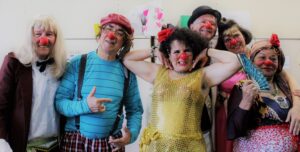 Lenisa Brandão is the speech therapist who leads the aphasia group, and she happened to be doing a clowning course at the time, so she asked if the participants would like an experienced actress to give a workshop on clowning as a theatrical expression. The idea of introducing clowning as a theatrical language has been solidifying as a complementary therapeutic practice especially for changing perspectives about failure and developing freedom / creativity within diversified communication styles.
Lenisa Brandão is the speech therapist who leads the aphasia group, and she happened to be doing a clowning course at the time, so she asked if the participants would like an experienced actress to give a workshop on clowning as a theatrical expression. The idea of introducing clowning as a theatrical language has been solidifying as a complementary therapeutic practice especially for changing perspectives about failure and developing freedom / creativity within diversified communication styles.
People living with aphasia often refrain from speaking due to their linguistic difficulties. Despite their largely preserved non-verbal skills, as well as their intact sense of humor and social skills, many people with aphasia experience much frustration and isolation during communication (Northcott, S., Simpson, Moss, Ahmed, & Hilari, 2018). Therefore, practicing clowning in a group can immerse people with aphasia in a context that can change their experience of communicating (Duarte, Rocha, & Brandão, 2020).
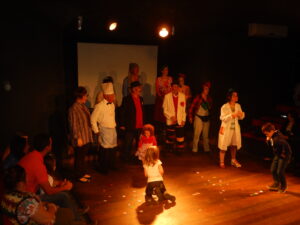
For clowns, failure is success (Weitz, 2012). The clown nose is “the tiniest mask in the world”, according to the theatrical master Lecoq (2000). Clowns are not taught to fake their emotions, they exercise the wisdom of being present and aware of their feelings, as well as exposing their vulnerability by sharing the part of themselves that is seen as ridiculous or naive (Hendriks, 2012). In a society that discriminates against those who speak or act differently, this little red mask can be a powerful therapeutic tool that can help a person feel free to reveal their humanity. Speech therapists who experience communication in dementia context can also enrich their concept of communication by practicing clowning.
The idea that communication is much more than speech and words is something that should be experienced by health professionals working with people living with language disorders. Notably when we talk about dementia, difficulties with communication because of multiple cognitive challenges are frequent, and the family shares the frustration experienced by the person with dementia, so it is crucial that the professional understands these channels and unlocks key skills to improve access to different forms of language. Social concepts about communication can also be amplified with this approach, and the general public interacting with a clown that lives with a neurological condition can change perspectives. When the audience laughs with a clown it is because the audience can identify with his humanity (Burnier, 2001).
In the Playful Living project, participants come together for the active practice of clowning with playful games and improvisations involving body, voice, gestures, and facial expressions. Each member of the group will be encouraged to discover and construct their own clown, working on aspects such as empathy, initiative, humor, adaptability, shared attention, and reciprocity.
The project focuses on welcoming the participants and building a safe place where they can feel comfortable and supported, creating an atmosphere of reciprocity between everyone, including the speech therapy students. This plays a key role in redefining communication characteristics and language difficulties, reducing the fear and insecurity that may initially exist. The environment for the practices will involve objects and costumes, as well as the use of music. These playful and artistic aspects, combined with a focus on horizontal relationships, ensure care and feelings of emotional security for all participants. The activities require creativity but are structured in a similar way week by week, which ensures a predictable progression. The structure of the sessions tends to remain the same, containing:
1) fun warm-up to ensure engagement;
2) role-play with fun games;
3) transition to clown status, done through costume change with hat and nose, and inclusion of music;
4) improvisational activities with an emphasis on spontaneity and based on guided scenarios and simple instructions.
Experienced clowns act as facilitators to provide instructions according to the initiatives and requirements of each participant. The improvisations often involve performing activities of daily life guiding the process of letting the imagination flow in the present moment to facilitate the emergence of creative actions. The approach used was inspired by Vivian Gladwell’s pedagogy, it emphasizes feelings of safety and carefully structured guidance during clowning practices. In the improvisations, the facilitator provides very short instructions or statements that are simple and unambiguous – thus facilitating the engagement of older people with dementia included in the group. The facilitator names what is happening and “invites” or “offers” an action to the participant, who as a result engages in the construction of a semi-structured narrative that prioritizes creativity and different forms of expression on stage. The clown facilitator will often direct attention to the problematic/comic situation and amplify a small aspect of the behavior. In addition, the facilitator will acknowledge the clown’s difficulty, being careful not to interrupt the process or deny what is happening in the scene.
The project has received funding from the Global Brain Health Institute, the Alzheimer’s Association, and the Alzheimer’s Society (GBHI ALZ UK – 20-641975) and has been / continues to be run in Porto Alegre and Santa Maria. The sustainability of the project is supported by the university teams that maintain the activities of the Aphasia group in UFSM and UFRGS universities.
Further information:
Lead on Programme: Lenisa Brandão – Speech therapist, Global Atlantic Fellow for Equity in Brain Health, Global Brain Health Institute, Trinity College Dublin. Associate Professor at the Federal University of Santa Maria (UFSM)
Lenisa(dot)brandao (at) gbhi(dot)org
Reference:
Brandão, L., Bauer, M. A., Haas, A. N., Silveira, R. D. S., Alves, C. P., Souza, D. N. D., Beber, B.A. & Oliveira, W. F. D. (2022). Playing remotely in times of crisis: A program to overcome social isolation. International Journal of Geriatric Psychiatry, 37(1).
The Reviving Memories project, by the Global Atlantic Fellow Carlos Chechetti, started with a curiosity of his: how can Alzheimer’s have its negative effect mitigated by what we love?
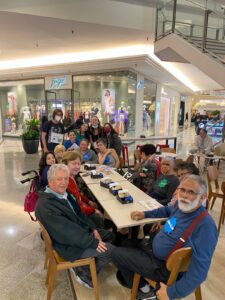
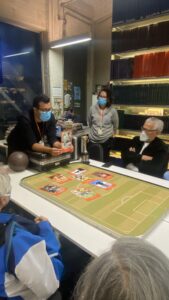
Carlos found a number of projects related to passion for music, dance, theatre and poetry, and in the midst of this he found a Scottish project that used football as a drive for a positive feeling. Carlos visited the program in 2018 and instantly recognized the effectiveness that being passionate about sport could bring to Brazilians living with Alzheimer’s.
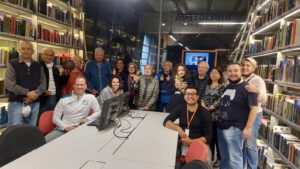
The Reviving Memories project, which talks about precisely those lifelong passions like art and football, started in museums, companies, hospitals and universities, but it was during the pandemic that it expanded territory also through virtual platforms, such as Google Meet, Zoom, Teams, Whatsapp and Facebook, reaching more than 1,000 people across Brazil.
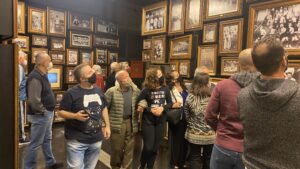
The coordinators use a series of interventions based on reminiscence and cognitive stimulation, but without losing the leisurely and delightful aspect of socializing. And it is through these guided conversations that the participants engage in dialogues, discussions and stories about the past and its relationship, for instance, with football.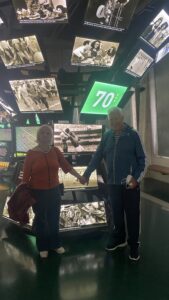
The programme, which has been active since 2017, still has no sponsorship, and warmly recalls its genesis in a pilot project with patients at the Hospital das Clínicas of the University of São Paulo Medical School. In 2022 the project became an NGO, starting a pursuit for funding to be able to cover other Brazilian regions.
Reviving memories is about what we enjoy, and from a very simple question “What are you passionate about?” you can put together a work plan that ensures the engagement of the person living with Alzheimer’s and their family members – and the return is fantastic!
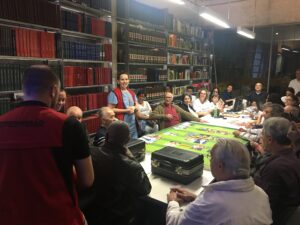
“it’s been a while since I’ve seen my dad talk and interact this much. He always gets sentimental in a positive light,” said one relative. “My mum always asks me when are we going back to the museum to see her friends and talk about football,” added another.
The project is special in many ways, but talking about our passions is not only a matter of ensuring engagement and collaboration, but of rescuing the dignity that can be compromised when part of our identity is at risk of being forgotten.
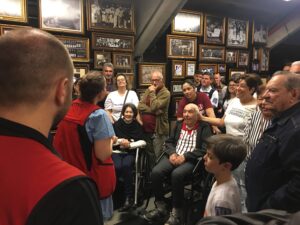
For more information, please contact:
Founder: Carlos Chechetti, Global Atlantic Fellow for Equity in Brain Health pelo Global Brain Health Institute, Trinity College Dublin.
carlos(dot)chechetti(at)revivendomemorias(dot)com(dot)br
Fernando was only 16 when his best friend was diagnosed with Alzheimer’s disease. She was his grandmother and adventure buddy. The consultation that delivered the diagnosis was sharp and cold, lasting about 15 minutes. After that, Google made sure to cover Alzheimer’s in a purely negative and stigmatized way, making the young lad think that he would never be able to take care of the person who had always taken care of him.
https://www.youtube.com/channel/UCBKvWjROGWIuyc7YDQyq-5A
It was this lack of positive content and multiple narratives that encouraged Fernando to create a fanpage on a social network named after his grandmother, where he would share all the daily stories that made that adventure together something so special.
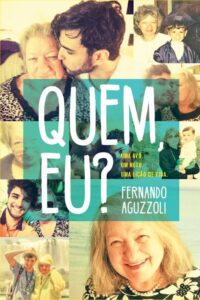
Everyone around him said that drug treatment was the only way out, but Fernando knew that this was not enough, and that even today dementias force families to accept a diagnosis that is incurable and insidious, but which allows us to learn lessons never before imagined.
To share these learnings and help other families in the same process, Fernando published his first book in 2014 (“Quem, eu?” Companhia das Letras Publishing House), where he tells his adventure after dropping philosophy school and his job to take care of his grandmother. After that, he published a book about Alzheimer’s aimed at children (“Grandpa is a Superhero” Saber & Ler / Quipu Publishing House), a beautiful artwork illustrated by the Argentinian Juan Chavetta, and released in Brazil and Latin American countries. The publication was chosen by a federal program and distributed to more than 150 thousand children in public schools throughout Brazil.
Fernando also wrote two other children’s titles (“Donde esta la Abuela?” e “La Aventura de Hipo” Quipu Publishing House) and a work aimed at caregivers and health professionals (“Alzheimer is not the end” Belas Letras Publishing House).
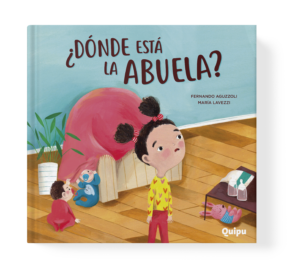
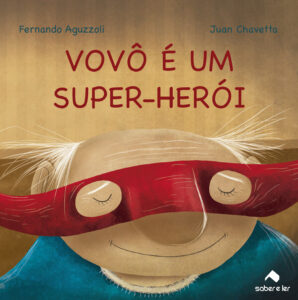
The motivation to continue writing, presenting interview shows and podcasts, giving lectures and developing projects focused on the dementia ecosystem remains the same: to offer more comfort to families living the same as his grandmother.
The books address numerous everyday strategies related to improving communication, reducing behavioural changes and improving quality of life from non pharmacological, but extremely creative interventions.
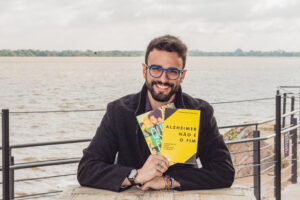 It is impossible to accept a diagnosis that is not understood, not to mention discussed. Fernando put the issue on the table and was called by a columnist from the newspaper Folha de São Paulo as “a voice for Alzheimer’s”.
It is impossible to accept a diagnosis that is not understood, not to mention discussed. Fernando put the issue on the table and was called by a columnist from the newspaper Folha de São Paulo as “a voice for Alzheimer’s”.
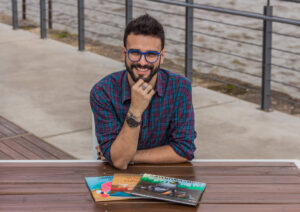 Fernando has managed to partner with different companies to distribute around 170,000 copies of his books free of charge to families living with Alzheimer’s. The books are also available in bookshops and libraries. The writer has set up a company, Instituto Vovó Nilva, which hosts these and other creative projects in partnership with organizations in numerous countries.
Fernando has managed to partner with different companies to distribute around 170,000 copies of his books free of charge to families living with Alzheimer’s. The books are also available in bookshops and libraries. The writer has set up a company, Instituto Vovó Nilva, which hosts these and other creative projects in partnership with organizations in numerous countries.
Links to articles:
For further Information:
Fernando Aguzzoli-Peres – Journalist, bestselling author and a Global Atlantic Fellow for Equity in Brain Health pelo Global Brain Health Institute, Trinity College Dublin.
Fernando(dot)peres(at)gbhi(dot)org
